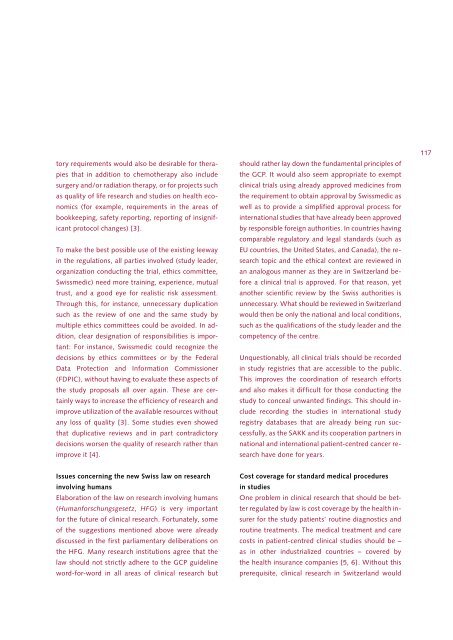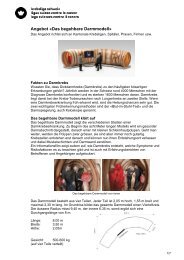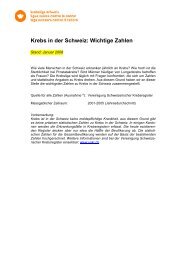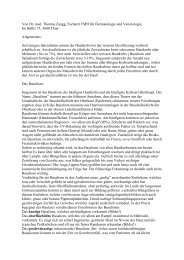Cancer Research in Switzerland - Krebsliga Schweiz
Cancer Research in Switzerland - Krebsliga Schweiz
Cancer Research in Switzerland - Krebsliga Schweiz
Create successful ePaper yourself
Turn your PDF publications into a flip-book with our unique Google optimized e-Paper software.
tory requirements would also be desirable for therapies<br />
that <strong>in</strong> addition to chemotherapy also <strong>in</strong>clude<br />
surgery and/or radiation therapy, or for projects such<br />
as quality of life research and studies on health economics<br />
(for example, requirements <strong>in</strong> the areas of<br />
bookkeep<strong>in</strong>g, safety report<strong>in</strong>g, report<strong>in</strong>g of <strong>in</strong>significant<br />
protocol changes) [3].<br />
To make the best possible use of the exist<strong>in</strong>g leeway<br />
<strong>in</strong> the regulations, all parties <strong>in</strong>volved (study leader,<br />
organization conduct<strong>in</strong>g the trial, ethics committee,<br />
Swissmedic) need more tra<strong>in</strong><strong>in</strong>g, experience, mutual<br />
trust, and a good eye for realistic risk assessment.<br />
Through this, for <strong>in</strong>stance, unnecessary duplication<br />
such as the review of one and the same study by<br />
multiple ethics committees could be avoided. In addition,<br />
clear designation of responsibilities is important:<br />
For <strong>in</strong>stance, Swissmedic could recognize the<br />
decisions by ethics committees or by the Federal<br />
Data Protection and Information Commissioner<br />
(FDPIC), without hav<strong>in</strong>g to evaluate these aspects of<br />
the study proposals all over aga<strong>in</strong>. These are certa<strong>in</strong>ly<br />
ways to <strong>in</strong>crease the efficiency of research and<br />
improve utilization of the available resources without<br />
any loss of quality [3]. Some studies even showed<br />
that duplicative reviews and <strong>in</strong> part contradictory<br />
decisions worsen the quality of research rather than<br />
improve it [4].<br />
Issues concern<strong>in</strong>g the new Swiss law on research<br />
<strong>in</strong>volv<strong>in</strong>g humans<br />
Elaboration of the law on research <strong>in</strong>volv<strong>in</strong>g humans<br />
(Humanforschungsgesetz, HFG) is very important<br />
for the future of cl<strong>in</strong>ical research. Fortunately, some<br />
of the suggestions mentioned above were already<br />
discussed <strong>in</strong> the first parliamentary deliberations on<br />
the HFG. Many research <strong>in</strong>stitutions agree that the<br />
law should not strictly adhere to the GCP guidel<strong>in</strong>e<br />
word-for-word <strong>in</strong> all areas of cl<strong>in</strong>ical research but<br />
should rather lay down the fundamental pr<strong>in</strong>ciples of<br />
the GCP. It would also seem appropriate to exempt<br />
cl<strong>in</strong>ical trials us<strong>in</strong>g already approved medic<strong>in</strong>es from<br />
the requirement to obta<strong>in</strong> approval by Swissmedic as<br />
well as to provide a simplified approval process for<br />
<strong>in</strong>ternational studies that have already been approved<br />
by responsible foreign authorities. In countries hav<strong>in</strong>g<br />
comparable regulatory and legal standards (such as<br />
EU countries, the United States, and Canada), the research<br />
topic and the ethical context are reviewed <strong>in</strong><br />
an analogous manner as they are <strong>in</strong> <strong>Switzerland</strong> before<br />
a cl<strong>in</strong>ical trial is approved. For that reason, yet<br />
another scientific review by the Swiss authorities is<br />
unnecessary. What should be reviewed <strong>in</strong> <strong>Switzerland</strong><br />
would then be only the national and local conditions,<br />
such as the qualifications of the study leader and the<br />
competency of the centre.<br />
Unquestionably, all cl<strong>in</strong>ical trials should be recorded<br />
<strong>in</strong> study registries that are accessible to the public.<br />
This improves the coord<strong>in</strong>ation of research efforts<br />
and also makes it difficult for those conduct<strong>in</strong>g the<br />
study to conceal unwanted f<strong>in</strong>d<strong>in</strong>gs. This should <strong>in</strong>clude<br />
record<strong>in</strong>g the studies <strong>in</strong> <strong>in</strong>ternational study<br />
registry databases that are already be<strong>in</strong>g run successfully,<br />
as the SAKK and its cooperation partners <strong>in</strong><br />
national and <strong>in</strong>ternational patient-centred cancer research<br />
have done for years.<br />
Cost coverage for standard medical procedures<br />
<strong>in</strong> studies<br />
One problem <strong>in</strong> cl<strong>in</strong>ical research that should be better<br />
regulated by law is cost coverage by the health <strong>in</strong>surer<br />
for the study patients’ rout<strong>in</strong>e diagnostics and<br />
rout<strong>in</strong>e treatments. The medical treatment and care<br />
costs <strong>in</strong> patient-centred cl<strong>in</strong>ical studies should be –<br />
as <strong>in</strong> other <strong>in</strong>dustrialized countries – covered by<br />
the health <strong>in</strong>surance companies [5, 6]. Without this<br />
prerequisite, cl<strong>in</strong>ical research <strong>in</strong> <strong>Switzerland</strong> would<br />
117

















